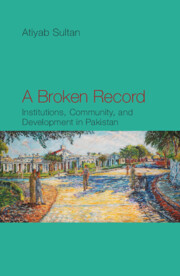Book contents
- Frontmatter
- Contents
- List of Figures
- List of Tables
- Preface
- Acknowledgements
- Introduction: Institutions, Debt, and the Deadweight of History, Punjab c. 1900–47
- 1 Glass Half Full?: Two Views of the Punjab
- 2 An Alternative Economic History of the Punjab
- 3 Combating Indebtedness I: Laws and Institutions
- 4 Combating Indebtedness II: Community Development in Colonial Punjab
- 5 The Bureaucrat’s Burden: Tales of Reform and Development
- 6 Colonialism and the Discourse on Development
- Postscript
- Glossary
- Bibliography
- Index
Introduction: Institutions, Debt, and the Deadweight of History, Punjab c. 1900–47
Published online by Cambridge University Press: 27 September 2022
- Frontmatter
- Contents
- List of Figures
- List of Tables
- Preface
- Acknowledgements
- Introduction: Institutions, Debt, and the Deadweight of History, Punjab c. 1900–47
- 1 Glass Half Full?: Two Views of the Punjab
- 2 An Alternative Economic History of the Punjab
- 3 Combating Indebtedness I: Laws and Institutions
- 4 Combating Indebtedness II: Community Development in Colonial Punjab
- 5 The Bureaucrat’s Burden: Tales of Reform and Development
- 6 Colonialism and the Discourse on Development
- Postscript
- Glossary
- Bibliography
- Index
Summary
The myth of eternal return states that a life which disappears once and for all, which does not return, is like a shadow, without weight, dead in advance, and whether it was horrible, beautiful or sublime, its horror, sublimity and beauty mean nothing. We need take no more note of it than of a war between two African kingdoms in the fourteenth century, a war that altered nothing in the destiny of the world, even if a hundred thousand blacks perished in excruciating torment.
—Milan Kundera, The Unbearable Lightness of BeingIn The Unbearable Lightness of Being, Milan Kundera discusses the problem of ‘eternal return’: he writes that in life everything would be cynically permitted if it were seen as happening only once, never recurring, and disappearing into a vacuum after occurrence. History is sometimes viewed as an account of events and things long past, a recital that may be interesting, dramatic, and tragic, but with little consequence in the long run. However, the discourse on institutional development is one that rakes the graveyard of history and raises a spectre haunting current day attempts at economic development. ‘Institutions’ are seen as almighty and eternal, and the post-colonial state as a corrosive inheritance of imperial rule that negatively affects progress by structuring the rules of the game and making any real welfare gains impossible. Simultaneously, the field of development studies has emerged as one that is ahistorical and forward-looking, constantly in search of innovative cures to lead poor countries to prosperity. This book is an attempt to historicize both the discourse on colonial institutions and prescriptions in development studies through an examination of economic reform in colonial Punjab.
The central argument of this study emerges from a dialectical engagement with the economic history of the Punjab on the one hand and theories and practices of development studies on the other. Existing scholarship on colonial Punjab views it either as a leading beneficiary of empire and the site for some of its greatest achievements, or as a victim of planned social and economic engineering that has perpetuated extractive institutions and poverty for successive generations in the region. This book argues that both these accounts of the colonial impact in the Punjab are preoccupied with macroeconomic and large-scale changes, such as the establishment of canal colonies, and ignore a history of microeconomic reform in the province that does not admit as reductive an assessment of empire as the two dominant and conflicting accounts.
- Type
- Chapter
- Information
- A Broken RecordInstitutions, Community and Development in Pakistan, pp. 1 - 6Publisher: Cambridge University PressPrint publication year: 2022



